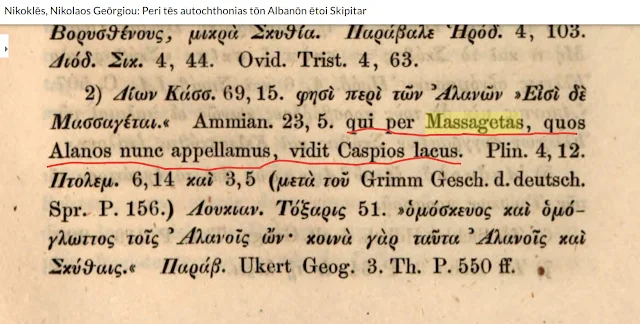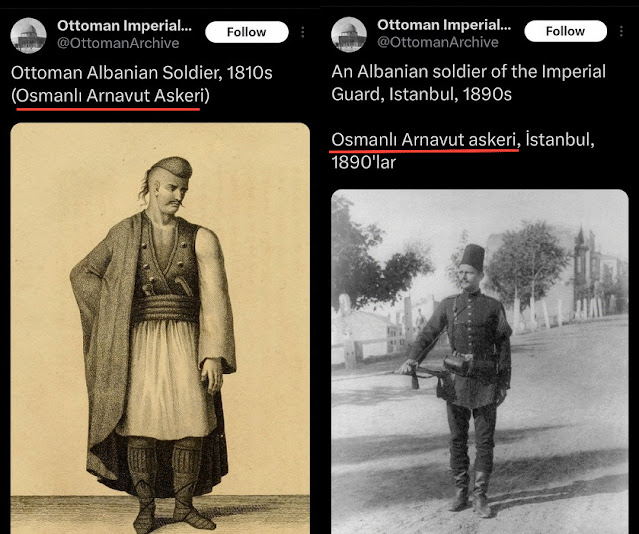Angelo Masci was an Italian state advisor and an attorney. He worked at the Santa Sofia of Epiro Calabria, Italy. In 1810, he was appointed Royal Commissioner for the divisions of state property, for the provinces of Calabria and Basilicata.
In 1817 and in 1820 he ascended to the position of Counselor of State. Furthermore, he was also a chaplain of the Royal Greek Macedonian regiment.
Masci was Greek. His last name has been modified as it is different from his parents’ last name. His uncle Giuseppe Bugliari was in fact Greek and a priest near Edessa in the Greek Macedonia. The real name of Giuseppe Bugliari was Ιώσηπος Bouliàrios.
Bouliaris signed his letter to the Caterina of Russia as Josif Bouliaris.
Italians divided these people, the others were killed by them. These priests had nothing to do with Albanians.
Pasquale Baffi, another priest working at the Santa Sofia D'Epiro, mentioned in the link above was another cousin of Angelo Masci and he was a Greek as well.
These sellout Greek priests were getting ready for the creation of the Albanian state and the invasion of Epirus and were manipulated by the Italian Church to tell lies about Epirus.
Angelo Masci published a book called Discorso sull'origine, costumi e stato attuale della Nazione Albanese (Discussions on the origin, customs, and current state of the Albanian nation), book currently promoted by the Albanian state claiming that Angelo Masci had the answers to the autochthony of Albanians.
Why didn’t the Albanian state make Angelo Masci’s book public?
Angelo Masci writes: Albania area was called Illyria Graeca or Macedonia.
Angelo Masci knows that Albanians came from Asia:
“This diversity has excited in the writers the idea that the Albanians are not indigenous to Greece, but that they derive their origin from the ancient Asian Albania located between the Black Sea and the Caspian” and mentions the authors that agree that Albanians came from Asia.
Angelo Masci writes: “Alexander: later with unspeakable courage challenged the pride of Roman power while the fields of Epirus smoked under the ruins of seventy cities”. (Romans proudly burned 70 cities in Epirus).
Angelo Masci knows that Albanians came from Asia: He writes: “This diversity has excited in the writers the idea that the Albanians are not indigenous to Greece, but that they derive their origin from the ancient Asian Albania located between the Black Sea and the Caspian” and mentions the authors that agree that Albanians came from Asia.
Why did he say that? Why did these authors believe that Albanians came from Asia? So it is true!
Angelo Masci is a disinformation agent, who trained Albanians to say absurdities and lies. He claims that the name Achilles in the Epirotan language was called
Aspetto.
But the word
Aspetto in Italian does not mean “fast” but means “await” from
aspettare (waiting) and the second meaning is (appearance,look).
Angelo Masci mentions Strabo: “Strabo reports that Theopompus numbered 14 Epirote nations… and they were all mixed with Illyrians”… Among them he mentions Chaonians, Molosssians, Thesprotians...but Albanians are not mentioned…Masci is frustrated and he can't make his case.
Angry that cannot prove the origins of the Albanians, Angelo Masci writes:
“But why go looking for the origin of the “Macedonian Albanians” among the Asians and the Scythians, if you can find it in Greece itself? And no arguments begged, but history bears very clear witness to all this. The Greek writers, taking the Albanians for what they really were, that is, indigenous to Macedonia and Epirus, never questioned their origin. That Region, which today is called Albania, was formerly denominated Greek Illyrian, the Greeks esteemed the Albans of Illyrian lineage…”
Angelo Masci mentions Massagetes as the Asian Albanians and that they are in fact Turks. Then he goes on to say that Turks have nothing in common with Albanians and are a different nation (not true). Why are the majority of the words in the Albanian language of Turkish origin?
In fact, Massagetes were the ancient Alans or Arrans, another name for Caspian Albanians.
Author: “Massagetes that we now call Alanos live in the Caspian Sea”.












